 |
 |
 |
 |
 |
 |
| |
 |
|
 |
 |
 |
  |
  |
 |
 |
 |
 |
|
|
 |
|
 |
 |
 |
BUILDING |
 |
|
 |
|
 |
 |
 |
| |
 |
| 
 |
E2 Ecology and Economy
|
|
 |
 |
 |
 |
DESIGNER |
 |
|
|
 |
|
 |
 |
 |
| |
 |
|
 |
 |
 |
 |
DESCRIPTION |
 |
|
|
 |
|
 |
 |
 |
|
|
 |
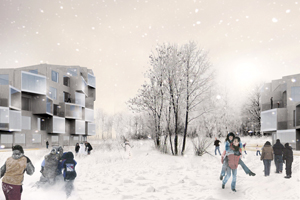 To meet the increasingly stringent environmental requirements of Finnish industrialized construction, the E2 Ecology & Economy timber development competition aims to find a conceptual design solution for large-scale production of wooden multi-story buildings. A 15.000 m2 prefabricated wooden development in Kouvola, Finland, will serve as a showcase for replicable and locally adaptable cost and energy efficient housing. BIG’s proposal PUU-BO is today announced as one of two winning entries of the two-staged invited competition totaling 26 international proposals. To meet the increasingly stringent environmental requirements of Finnish industrialized construction, the E2 Ecology & Economy timber development competition aims to find a conceptual design solution for large-scale production of wooden multi-story buildings. A 15.000 m2 prefabricated wooden development in Kouvola, Finland, will serve as a showcase for replicable and locally adaptable cost and energy efficient housing. BIG’s proposal PUU-BO is today announced as one of two winning entries of the two-staged invited competition totaling 26 international proposals.
Wood as construction material brings a double benefit: remarkably reduced emissions in its production and fabrication and improved energy efficiency of the buildings where it is used. Currently, only a fragment of multi-story buildings utilize timber construction in Finland, a country known for its timber production. BIG’s PUU-BO is a comprehensive prefab solution designed to be both extremely flexible and materially efficient. PUU-BO’s conception as a system based on best practices and not predefined standard elements, gives it an embodied intelligence and ensures its viability for the future. The system’s easy adaptability to a variety of building typologies and uses, opens up new possibilities for prefabricated wood systems beyond the residential market - the very same elements in the residential pilot project could be used in an office building or even a wood skyscraper with no loss in material efficiency.
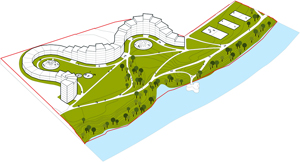 “BIG’s point of direction was to design an innovative system that can fit any built environment for any type of use. Rather than developing a system based on current market demands, we wanted to make a system so flexible it can embrace as many building typologies and functionalities as possible. Instead of making the most carbon neutral system at present; we develop a system that evolves into the future. This way the system respects the ever increasing key drivers for sustainability while being competitive with other building systems”, Thomas Christoffersen, Partner-in-Charge, BIG. “BIG’s point of direction was to design an innovative system that can fit any built environment for any type of use. Rather than developing a system based on current market demands, we wanted to make a system so flexible it can embrace as many building typologies and functionalities as possible. Instead of making the most carbon neutral system at present; we develop a system that evolves into the future. This way the system respects the ever increasing key drivers for sustainability while being competitive with other building systems”, Thomas Christoffersen, Partner-in-Charge, BIG.
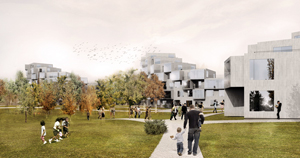 A site with generous views towards public green areas and the city’s river has been specifically selected for this pilot project by the city of Kouvola. The location allows the volume of the proposed building to push from one side to the other side to integrate the park and parking along the development. BIG’s proposal follows the contours of the landscape creating semi-private pockets directly connected to the park while the height of the building is manipulated to peak towards the open areas. The pockets are surrounded by lower housing creating an intimate space where all units are connected to the ground. The areas with the best views have the most floors and the most apartments while all roofs are partially accessed by the penthouse apartments and all units at ground floor have access to private gardens to both sides. A site with generous views towards public green areas and the city’s river has been specifically selected for this pilot project by the city of Kouvola. The location allows the volume of the proposed building to push from one side to the other side to integrate the park and parking along the development. BIG’s proposal follows the contours of the landscape creating semi-private pockets directly connected to the park while the height of the building is manipulated to peak towards the open areas. The pockets are surrounded by lower housing creating an intimate space where all units are connected to the ground. The areas with the best views have the most floors and the most apartments while all roofs are partially accessed by the penthouse apartments and all units at ground floor have access to private gardens to both sides.
BIG’s E2 proposal combines a variety of housing typologies – from 8-story apartment buildings to low townhouses with a shared courtyard space. Along both sides of the building a pedestrian path connects the private gardens to parking and park. The path blends with the existing network, integrating the building with the park, river and city. Playgrounds, sports fields, and a community sauna in the river are strategically placed in order to activate the site. All activities are available to both the PUU-BO inhabitants as well as the citizens of Kouvola. |
|
 |
 |
 |
|
 |
|
| About E2 |
 |
|
 |
The city of Kouvola in cooperation with the Finnish Forest Industries association, the Finnish Forest Foundation, the Finnish Funding Agency for Technology and Innovation, the Finnish Innovation Fund SITRA, KSS-Energia Oy and the Regional Council of Kymenlaakso aims at fostering new solutions for industrial production of wooden multi-story buildings through the launch of E2 Timber Development Competition and a future Centre of Competence in Timber Construction, “Wood-Inno”. The concept competition is expected to offer energy efficient solutions which reduce the carbon foot print, and could help Finland to take leadership in the field of timber construction worldwide.
Edit by BIG Bjarke Ingels Group |
|
 |
 |
 |
|
 |
|
|
|
 |
|
 |
 |
 |
 |
 |
 |
 |
ECO-SUSTAINABILITY |
 |
|
|
 |
|
 |
 |
 |
|
|
 |
PUU-BO
EXECUTIVE SUMMARY
When asked to design a building system for the housing market in Finland and its major export countries, the point of direction was to design an Innovative system, that can fit in any built environment for any type of use. Rather than developing a system based on market studies or dubious forecasts, we wanted to make a system so flexible it can embrace as many building typologies and functionalities as possible. At the same time the system should be sustainable both in its construction and consumption, while being competitive with existing building systems, mainly of concrete elements.
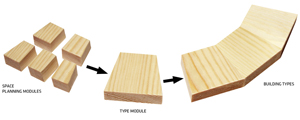
We propose a roadmap for wooden construction to reach the same efficiency as today’s concrete elements without repeating the mistakes of the concrete industry.
Instead of making the most carbon neutral system from the beginning we develop a system that evolves over time. This way the system respects the ever increasing key driverzs for sustainability while being competitive with other building systems. The system is applicable to any functional needs, -markets, -building codes, and energy demands. The main load bearing parts are 100% wood; all other parts are made from wood when possible and implemented when the given technology is available and affordable.
We propose a roadmap for wooden construction to reach the same efficiency as today’s concrete elements without repeating the mistakes of the concrete industry.
WHAT’S PUU-BO?
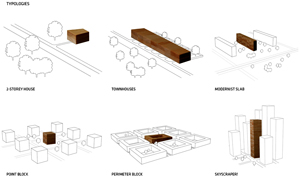 PUU-BO is a comprehensive prefab solution that is both more flexible and materially efficient than anything else on the market today. As a system that is based not on predefined, standard elements but best practices, it is built for evolution. PUU-BO is engineered to be adaptable across a range of typologies and building uses - the very same elements in our residential demonstration project could be used in a wood skyscraper with no loss in material efficiency! Only the columns and shear walls would need to be adjusted. Consequently, the structural system is very open and flexible and can accommodate anything from small housing to open office plans. PUU-BO is a comprehensive prefab solution that is both more flexible and materially efficient than anything else on the market today. As a system that is based not on predefined, standard elements but best practices, it is built for evolution. PUU-BO is engineered to be adaptable across a range of typologies and building uses - the very same elements in our residential demonstration project could be used in a wood skyscraper with no loss in material efficiency! Only the columns and shear walls would need to be adjusted. Consequently, the structural system is very open and flexible and can accommodate anything from small housing to open office plans.
WHAT’S THE INVESTMENT?
To start now, -nothing. PUU-BO is ready to go today with available resources in the Finnish market, but is part of a larger framework for evolution to make it even better tomorrow. We use the right materials for today, based on performance and not dogma.
WHAT’S THE RETURN?
PUU-BO's conception as a system based on best practices gives it an embodied intelligence and ensures its viability for the future. Its easy adaptability to a variety of building typologies and uses opens up new possibili- ties today for prefabricated wood systems beyond the residential market. New products, solutions, and busi- nesses will naturally result.
FROM CONCRETE TO WOOD
Corbusier’s DOM-INO system was developed to industrialize construction with the new technologies of concrete structures at the time, and bring qualitative space to the masses. Today we face different challenges that call for new solutions.
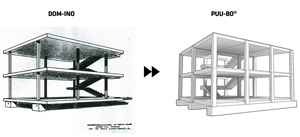
The vast majority of construction in forest rich Finland utilizes concrete. PUU-BO presents an alternative for the construction industry: to build new sustainable structures with wood. We address the growing demand for energy efficient, low carbon structures with an ever-evolving building system that is both competitive and innovative.
PUU-BO is a comprehensive prefabricated solution that is both more flexible and materially efficient than anything else on the market today. It is a system based not on predefined, standard elements but best practices. As such, it is designed for evolution. PUU-BO is engineered to be adaptable across a range of typologies and building uses - the very same elements could be used in both a 2-storey residential house and a wood skyscraper with no loss in material efficiency!
An 8-storey low-energy pilot project is planned in the Finnish city of Kouvola, on the banks of the river Kymi. It is expected to be built in 3 phases, giving us the opportunity to evaluate and improve the system from phase-to-phase in an iterative process. Simultaneous product development, testing, and other efforts are to be pursued with the relevant stakeholders.
Edit by BIG Bjarke Ingels Group |
|
 |
 |
 |
 |
 |
 |
 |
LOCATION |
 |
|
|
 |
|
 |
 |
 |

|
 |

|
Continent |
|
 |
|
Nation |
|
 |
|
Province |
|
 |
|
Region |
|
 |
|
District |
|
 |
|
Town |
|
 |
|
Hamlet |
|
 |
|
Address |
|
 |
|
|
|
 |
|
 |
 |
 |
 |
|
TYPOLOGY |
 |
|
|
 |
|
 |
 |
 |
|
|
 |
ARCHITECTURE | Residential buildings
Multiple dwelling
|
TOWN PLANNING AND URBAN DESIGN | Urban design and urban renovation
Residential areas, blocks and districts
| |
 |
 |
 |
 |
CHRONOLOGY |
 |
|
|
 |
|
 |
 |
 |
Project |
 |
|
 |
| 
 |
2010 - 2011
project winner of limited competiton
|
|
Realisation |
 |
|
 |
| 
 |
2011 - 2013 |
|
 |
 |
 |
 |
CLIENT |
 |
|
|
 |
|
 |
 |
 |
| |
 |
City of Kouvola
SITRA-Finnish Innovation Fund |
|
 |
 |
 |
 |
DIMENSIONAL
DATA |
 |
|
|
 |
|
 |
 |
 |
| Surface |
 |
|
 |
|
| Floors |
 |
|
 |
|
 |
 |
 |
 |
STRUCTURES |
 |
|
|
 |
|
 |
 |
 |
| |
 |
| Pirmin Jung Holzbauingenieur |
|
 |
 |
 |
 |
STAFF |
 |
|
|
 |
|
 |
 |
 |
Project  |
 |
|
|
 |
|
|
 |
|
Principal-in-charge |
 |
| Bjarke Ingels, Thomas Christoffersen |
|
Project leader |
 |
|
Design team |
 |
| Krista Meskanen, Jelena Vucic, Alina Tamosiunaite, Alessandro Ronfini, Cecilia Ho, Elisha Nathoo, Sunming Lee, Long Zhuo, Mads Bjorn Christiansen |
|
Structural consultant |
 |
| Pirmin Jung Holzbauingenieur (Wood constructions) |
|
Consultant |
 |
AOA Anttinen Oiva Architects Ltd
Vahanen Engineers
Stora Enso |
|
 |
  |
 |
|
|